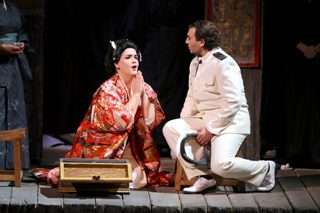|
Back
A Ligurian Butterfly to Remember Genova
Teatro Carlo Felice
06/14/2019 - & June 15*, 16, 18, 19, 20, 2019
Giacomo Puccini: Madama Butterfly
Maria Teresa Leva/Keri Alkema* (Cio-Cio San), Raffaella Lupinacci/Carlotta Vichi* (Suzuki), Marta Leung (Kate Pinkerton), Stefan Pop/Ragaa El Din* (F.B. Pinkerton), Stefano Antonucci/Sundet Baigozhin* (Sharpless), Didier Pieri (Goro), John Paul Huckle (Lo zio Bonzo), Claudio Ottino (Yamadori)
Coro del Teatro Carlo Felice, Francesco Aliberti (Chorus Master), Orchestra del Teatro Carlo Felice, Giuseppe Acquaviva (Conductor)
Lorenzo Amato (Stage Director), Ezio Frigerio (Sets), Franca Squarciapino (Costumes)

K. Alkema, R. El Din (© Marcello Orselli)
Of Puccini’s most frequently performed operas (Manon Lescaut, La Bohème, Tosca, Madama Butterfly and Turandot), Madama Butterfly is the opera that has fared the poorest over time. The “Orientalist” view of the victimized Asian girl was not considered patronizing at the time of the opera’s creation. Even after European countries lost their colonial empires in Africa and Asia, this view prevailed for much of the second half of twentieth century. The Korean and Vietnam Wars continued to confirm this cultural distortion. However, these ideas are markedly dated in the early twenty first century, with China imminently displacing the U.S. as the world’s leading economy, and with many other Asian powers enjoying more sophistication and technological advances than North America and Europe, trapped by stagnant economies and faltering infrastructures. Though aesthetically acceptable, Lorenzo Amato’s conventional staging of Butterfly was further proof of how dated Puccini’s popular opera has become. Stylized, more abstract stagings which don’t opt for a straightforward presentation seem more viable.
One incongruity was Pinkerton’s Japanese casetta which was a colossal structure lacking the delicacy one associates with Japan, and especially with Madama Butterfly. Dark colours and dim lighting throughout dampened emotions. At times, a change to bright colours and brighter lighting would have conveyed positive emotions. Even the lighting in Butterfly’s garden more strongly evoked a Scandinavian winter than springtime in the Land of the Rising Sun.
Despite the drab staging, this was a moving and powerful production thanks to the two lead singers who portrayed Butterfly and Pinkerton. American soprano Keri Alkema masterfully brought to life the tragic Japanese Geisha. It is hard for any adult soprano to act as a convincing fifteen year old (“quindic’anni”) in the first act, but Alkema managed to be that innocent girl both vocally and dramatically. The contrast in both her deportment and her timbre between the first and second acts was tremendous. Though not a native speaker of Italian, Alkema’s diction was exemplary: “Noi siamo gente avvezza, alle piccole cose umili e silenziose” in the Act I love duet, “Oh, mi fate tanto male, tanto male, tanto, tanto” in her Act II exchange with Sharpless and most of all “Troppa luce è di fior, e troppa primavera” when she realizes Pinkerton isn’t coming back. She masterfully conveyed Butterfly’s modesty, dignity and despair in these three phrases respectively, with an uncanny naturalness. Likewise, Egyptian tenor Ragaa El Din, was an ideal Pinkerton. Dashing in his white navy suit, he had excellent posture and imposing stage presence, which, combined with a healthy young voice, made it clear within moments that this nonchalantly self-confident man would cause suffering. His Act III “Addio fiorito asil” was impeccable, making one wish he had more to sing. With such strong interpreters, the Act I Love Duet “Bimba dagli occhi pieni di malìa” was the highlight of the opera. It was impressive to see Ragaa El Din modulate his huge voice to convey tenderness. The love duet which lasts roughly twenty minutes built up –con dolcezza – to its erotic pre-coital finale. Conductor Giuseppe Acquaviva, who in general opted for slow tempi and induced a certain ennui, was able to properly accompany the two singers in one of the operatic repertoire’s most beautiful duets.
Carlotta Vichi’s Suzuki was efficient. Though her timbre is on the light side, her voice blended well with Alkema’s. She portrayed a devoted servant and friend. In the final act, her despair and dignity were poignant, auguring Butterfly’s tragic end. Kazakh baritone Sundet Baigozhin was a sympathetic Sharpless. Despite his young age, he managed to convey an avuncular side that made this glorified pimp seem likeable and compassionate. Even the smaller roles were well sung and acted. Marta Leung’s Kate Pinkerton, a part too brief to be significant, was appropriately detestable. Her deportment and drab costume helped paint her as loathsome. Kudos to Didier Pieri’s Goro, the enterprising matchmaker, for making something out of his small role. Thanks to his excellent acting skills, he managed to make Goro both slimy and almost sympathetic! Usually interpreted by older singers, the philandering Prince Yamadori was efficiently sung by the young tenor Claudio Ottimo. The chorus was well-rehearsed, though some members were guilty of overacting. With an almost ideal cast, this could have been a superlative Madama Butterfly had the conducting been more dynamic and the staging more inspired.
Ossama el Naggar
|